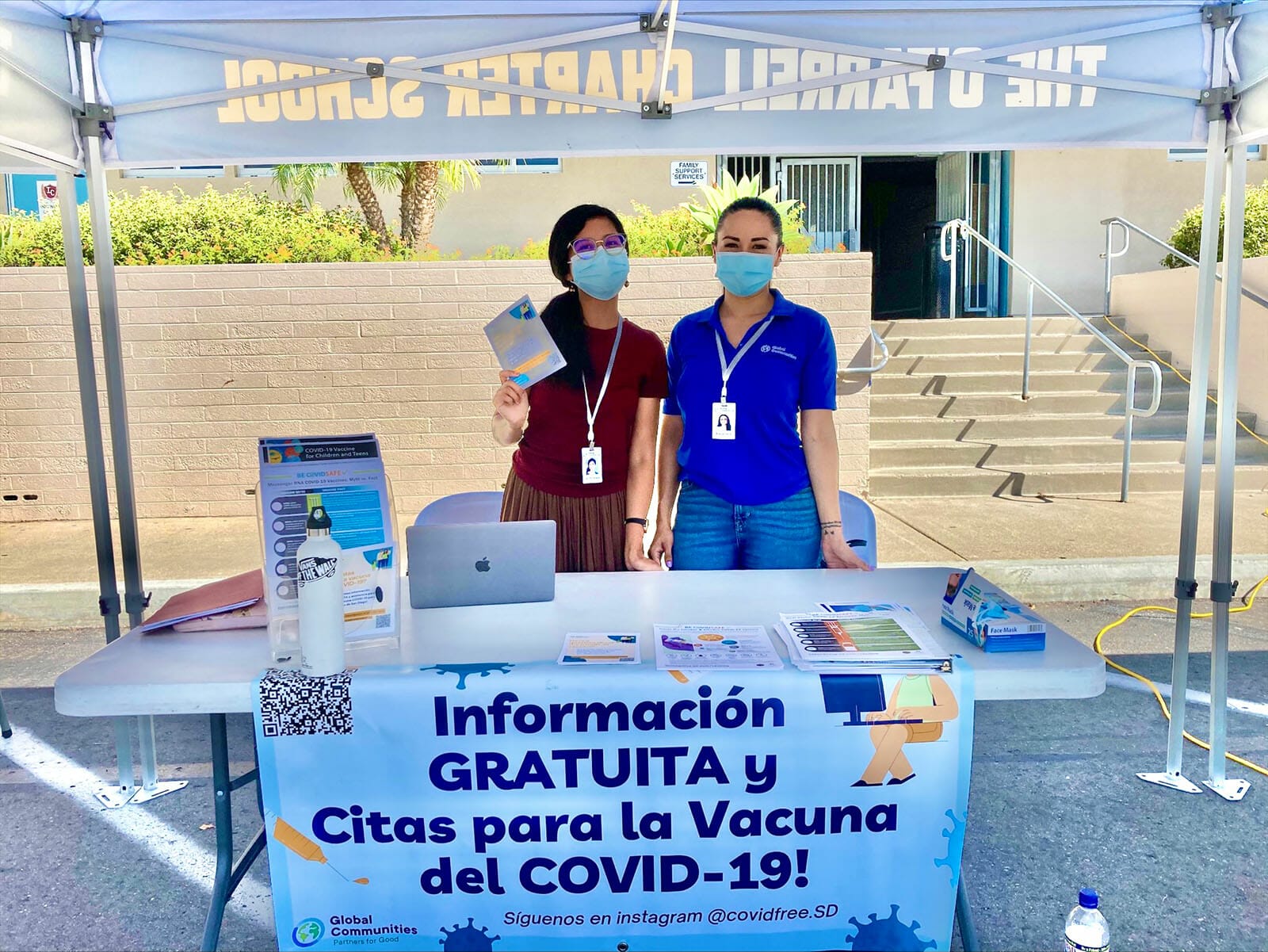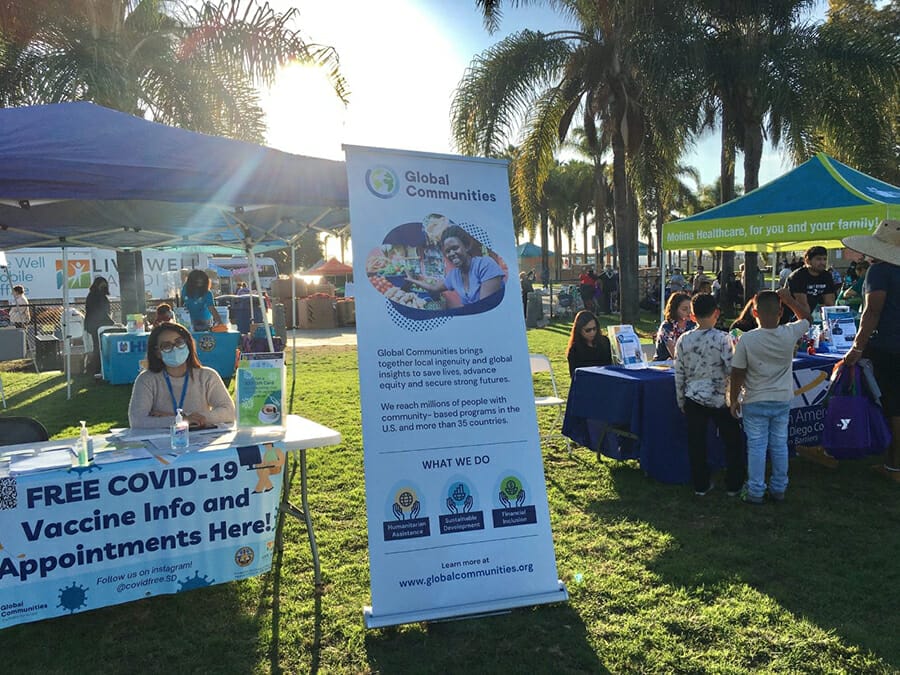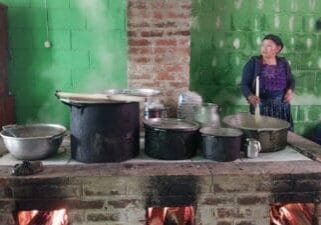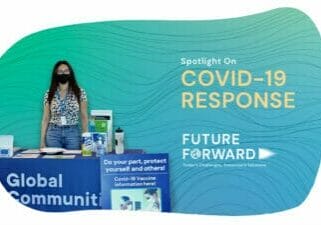News > Blog
Reflecting on the COVID-19 Response Program’s Impact in San Diego
Published 07/18/2022 by Global Communities

In May 2020, the world could not fathom what the future had in store, nor could Global Communities (then Project Concern International) envision the myriad of needs we would serve in response to the COVID-19 pandemic in San Diego.
Fast forward more than two years and what began as a community-centered contact tracing program turned into a thriving partnership with the County of San Diego’s Health and Human Services Agency (HHSA).
From the outset, COVID-19 exposed discrepancies in health equity across the United States. In San Diego County, for example, 44.3 percent of all cases1 and 43.8 percent of deaths2 due to COVID-19 were among Hispanics or Latinos, even though only 30.1 percent3 of the population identifies as Hispanic or Latino. To improve COVID-19 prevention among vulnerable, hard-to-reach populations, HHSA engaged Global Communities as a trusted local partner to provide contact tracing, vaccine education and outreach services in 15 languages (including English).
A COMMUNITY-CENTERED APPROACH TO CONTACT TRACING
By hiring staff members directly from the communities being served, who also had experience with technology, epidemiology and customer service, Global Communities was able to build trust and provide culturally adapted information about COVID-19 to clients in their preferred languages. This also allowed our team to tailor public health messaging in ways that helped overcome barriers particular to certain populations.
“I think understanding the cross-border culture and the nuances of that dynamic has been really important,” said Victor Ruiz, a binational contact tracer on Global Communities’ COVID-19 Response team from the U.S.-Mexico border region. “Being able to talk to contacts in their language, they feel more comfortable sharing information. They feel understood, because someone like them is speaking to them.”
From August 2020 through June 2021, Global Communities traced 6,880 COVID-19 contacts. Of those successfully reached, we were able to talk with 97.8 percent of people within 24 hours from when we received their information from the County of San Diego, ensuring that we promptly notified them of their COVID-19 exposure. We helped households navigate how to best quarantine or isolate given their individual situations and assisted people with getting support from employers to not work when exposed to or sick with COVID-19.
“We called an older woman in her 80s who was living with both of her sons, one of whom has a disability. She was a contact, and one of her sons was the case. They were really struggling,” said Arwa Alkhawaja, a COVID-19 Outreach Specialist. “When I spoke to her son, he did not have health insurance. He wanted to get tested, but at the same time, he did not want to leave home. He didn’t want to potentially expose others. We found the closest testing locations for him and gave him all the information he needed. … He was so appreciative. It was as if the family was sinking and not knowing what to do, and they were waiting for someone else to come and show them that they are not alone.”

BRIDGING THE GAPS IN COVID-19 VACCINE EDUCATION & ACCESS
Once the COVID-19 vaccine became available, Global Communities again partnered with the County HHSA in May 2021 to provide vaccine information and services to communities with low vaccination rates. We focused on reaching people who were not accessing vaccine resources in the North and North Central regions of San Diego due to supply-related barriers (e.g., appointment deficits and vaccine stock-outs), demand-related barriers (e.g., mistrust and misinformation) or socioeconomic factors.
Our team partnered with key community organizations such as Champions for Health and Meals on Wheels to get vaccines to people who otherwise could not access vaccine sites, including homebound elderly residents and other underserved populations. In particular, Global Communities developed a strong relationship with Muslim communities through organizations such as the Afghan Community Islamic Center and Muslim Leadership Council, which allowed us to work closely with refugees and recent arrivals to the United States.
By collaborating with faith communities, schools and community centers, our team was able to meet people where they naturally gather to share accurate and timely COVID-19 information. For example, Global Communities scheduled education activities and vaccine events at schools to take place before the holidays and at times when more socializing (and thus surges in COVID-19 cases) were expected. We also conducted webinars, town halls and presentations at parent-teacher association (PTA) meetings to increase understanding of the COVID-19 vaccine in communities. By June 2022, we had organized over 175 outreach and 32 vaccine events to reach more than 4,000 people across two regions of San Diego.
While COVID-19 continues to have a presence in our communities, we are proud to be closing our efforts knowing we have built capacity among community partners now better-equipped to respond to health emergencies. Over the past two years, we have formed an incredible team of diverse and talented staff who are trained and eager to tackle health disparities among their home communities and beyond. Through the challenge of this unprecedented emergency response, Global Communities developed new business models for working with donors, strengthened local partnerships and designed technological platforms that will be invaluable for future programming.
For a complete overview of Global Communities’ COVID-19 Response Program in San Diego, including key lessons learned, download the following brief.
Written by Alina Shaw and Stephanie Yoon, Directors of the COVID-19 Response Program
[1] https://www/sandiegocounty.gov/content/dam/sdc/hhsa/programs/phs/Epidemiology/COVID-19%20Race%20and%20Ethnicity%20Summary.pdf
[2] https://www/sandiegocounty.gov/content/dam/sdc/hhsa/programs/phs/Epidemiology/COVID-19%20Deaths%20by%20Demographics.pdf
[3] https://www.census.gov/quickfacts/fact/table/sandiegocitycalifornia/PST045221



